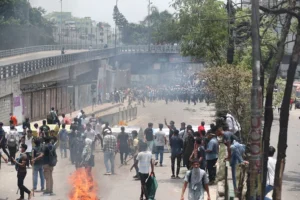by Nava Thakuria

After nearly hundreds of young people, precisely students, were killed by the government armed forces in liaison with the ruling party affiliates in Bangladesh, the country’s lone Nobel laureate, Professor Muhammad Yunus, made a clarion call to the international community, including the United Nations to halt the murder of agitating Bangladeshi nationals across the south Asian nation.
“The nationwide killing spree of Bangladeshi students and other citizens must be prevented. I urge the media outlets across the globe to come forward reporting the ground reality so that many precious lives can be saved,” said Prof Yunus, a man of international fame for his revolutionary banking and social business that enhances not only Bangladesh but many nations on Earth, but faces personal harassments from Prime Minister Sheikh Hasina with several fictitious legal charges.
Speaking to this writer from Dhaka on Monday, Prof Yunus also insisted on quality television debates and pragmatic editorials over the turmoil faced by his beloved country of 170 population, where even the ‘high school students become the victims’ as they joined the anti-quota movement in Bangladesh that began on 1 July following a court order reinstating the reservation facility for the dependents of war veterans.
“Engulfed in a serious crisis, Bangladesh witnesses millions of students and others protesting nationals have been attacked by the police and Border Guard Bangladesh personnel leading to more than 200 deaths and 700 injuries, some of whom remain in serious health conditions,” exclaimed Prof Yunus, adding that ‘there must be investigations into the killings that have taken place already’.
Though it began with a peaceful protest demonstration on the prestigious Dhaka University premises demanding the reservation quota for the dependents of freedom fighters’ families (who fought against the brutal Pakistani forces) in the government jobs to be abolished, it spread quickly to other university campuses and cities. The general population, seemingly unhappy with the Awami League-led government in Dhaka that achieved the fourth consecutive victory in the last national elections with no opposition candidates, joined the movement to make it a national outrage against the Hasina regime.
The ruling party leaders, including some ministers in Hasina’s cabinet, allege that the anti-quota movement is now hijacked by the BNP (along with Jamaat-e-Islami) workers to topple the government. They claimed that the so-called agitators, with the endorsement of BNP leaders, had indulged in violent activities. BNP chief Khaleda Zia’s son Tarique Rahman, who is living in exile for years, has also been accused of hatching a conspiracy against the government. The ruling party leaders also denied the allegation that the quota facility had only benefited Hasina’s loyalists in various government jobs.
The government imposed a nationwide curfew with the shoot-at-sight order on 20 July and deployed military personnel to support the police and civilian authorities. The agitation turned violent following the aggression shown by the members of Bangladesh Chhatra League and Juba League (student and youth wing of ruling Awami League) on the agitators. Lately, the Supreme Court restricted the reservation space to freedom fighters’ families from 30 to 5 percent. But the apex court did not scrap the reservation policy. Hence, it may not immediately quell the protest, as the students vowed to continue their movement until the particular quota was abolished.
Amidst the chaos, a young reporter named Hasan Mehedi was killed in the Jatrabari area of Dhaka on 18 July. Mehedi, who worked for the Bangla digital media outlet Dhaka Times, was covering the clashes that erupted between the police forces and agitating students and died of bullet injuries in his head. Various global media safety and rights bodies, including Paris-based Reporters Sans/without Borders (RSF) and Geneva- Press Emblem Campaign (PEC), expressed shock and grief over the killing of Mehedi and demanded a fair probe into the incident that led to his death.
Over 30 journalists were wounded while covering the protest demonstrations in the last few days. PEC president Blaise Lempen, while speaking to this writer from Geneva, stated that the media persons in Bangladesh have to work in an adverse situation because of many brutal laws formulated by the Bangla government in Dhaka in recent years. He urged Dhaka to look into the matter seriously and adequately compensate the bereaved family as early as possible.
Prof Yunus finally called on world leaders to do everything within their powers to end the violence against those exercising their rights to protest. Internet and telephone services have been restricted, so it is unlikely that his fellow citizens will hear this appeal soon or be able to take their initiative. So the octogenarian banker turned social thinker urged the people of goodwill around the world to add their voices to the call to end this carnage so that the natives can go back to our mission to build a self-reliant, democratic, and peaceful Bangladesh.
